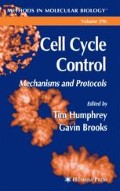Abstract
The identification of protein binding partners often facilitates understanding of protein complex function. However, identifying binding partners has proven difficult because proteins are often bound to insoluble structures or are only present during certain stages of the cell cycle. Fortunately, Xenopus eggs stockpile many proteins, which are typically insoluble, as soluble subcomplexes to facilitate rapid early embryonic divisions. We exploited this by developing a purification scheme using Xenopus egg extracts to isolate Coomassie-stainable amounts of the xNdc80 kinetochore complex. In this scheme Xenopus eggs are directly made into a mitotic high-speed supernatant and then flowed over three chromatographic columns: heparin, MONOQ, and Superose 6 gel filtration columns. A final immunoprecipitation is then performed from the peak Superose 6 column to yield Ndc80 complex purified to homogeneity. With minor modification and manipulation of Xenopus egg extracts, this protocol can easily be adapted for purification of other protein complexes.
Access this chapter
Tax calculation will be finalised at checkout
Purchases are for personal use only
References
Rieder, C. L. and Salmon, E. D. (1998) The vertebrate cell kinetochore and its roles during mitosis. Trends Cell Biol. 8, 310–318.
Cheeseman, I.M., Anderson, S., Jwa, M., et al. (2002) Phospho-regulation of kinetochore-microtubule attachments by the Aurora kinase Ipl1p. Cell 111, 163–172.
McCleland, M.L., Gardner, R. D., Kallio, M. J., et al. (2003) The highly conserved Ndc80 complex is required for kinetochore assembly, chromosome congression, and spindle checkpoint activity. Genes Dev. 17, 101–114.
Zheng, L., Chen, Y., and Lee, W.H. (1999) Hec1p, an evolutionarily conserved coiledcoil protein, modulates chromosome segregation through interaction with SMC proteins. Mol. Cell. Biol. 19, 5417–5428.
Wigge, P.A., Jensen, O. N., Holmes, S., Soues, S., Mann, M., and Kilmartin, J. V. (1998) Analysis of the Saccharomyces spindle pole by matrix-assisted laser desorption/ionization (MALDI) mass spectrometry. J. Cell Biol. 141, 967–977.
Janke, C., Ortiz, J., Lechner, J., et al.(2001) The budding yeast proteins Spc24p and Spc25p interact with Ndc80p and Nuf2p at the kinetochore and are important for kinetochore clustering and checkpoint control. EMBO J. 20, 777–791.
Kilmartin, J.V. and Janke, C. (2001) The budding yeast proteins Spc24p and Spc25p interact with Ndc80p and Nuf2p at the kinetochore and are important for kinetochore clustering and checkpoint control. J. Cell Biol. 152, 349–360.
Wigge, P.A. and Kilmartin, J. V. (2001) The Ndc80p complex from Saccharomyces cerevisiae contains conserved centromere components and has a function in chromosome segregation. J. Cell Biol. 152, 349–360.
DeLuca, J.G., Moree, B., Hickey, J. M., Kilmartin, J. V., and Salmon, E. D. (2002) hNuf2 inhibition blocks stable kinetochore-microtubule attachment and induces mitotic cell death in HeLa cells. J. Cell Biol. 159, 549–555.
Martin-Lluesma, S., Stucke, V.M., and Nigg, E. A. (2002) Role of Hec1 in spindle checkpoint signaling and kinetochore recruitment of Mad1/Mad2. Science 297, 2267–2270.
Harlow, E. and Lane, D. (1988) Antibodies: A laboratory manual. Cold Spring Harbor Laboratory Press, Cold Spring Harbor, NY.
Lohka, M.J. and Masui, Y. (1983) Formation in vitro of sperm pronuclei and mitotic chromosomes induced by amphibian ooplasmic components. Science 220, 719–721.
Murray, A.W. and Kirschner, M. W. (1989) Cyclin synthesis drives the early embryonic cell cycle. Nature 339, 275–280.
Murray, A. W., Solomon, M. J., and Kirschner, M. W. (1989) The role of cyclin synthesis and degradation in the control of maturation promoting factor activity. Nature 339, 280–286.
Kuang, J., Penkala, J. E., Ashorn, C. L., Wright, D. A., Saunders, G. F., and Rao, P. N. (1991) Multiple forms of maturation-promoting factor in unfertilized Xenopus eggs. Proc.Natl. Acad. Sci. USA 88, 11530–11534.
Editor information
Editors and Affiliations
Rights and permissions
Copyright information
© 2005 Humana Press Inc.
About this protocol
Cite this protocol
McCleland, M.L., Stukenberg, P.T. (2005). Purification of the Ndc80 Kinetochore Subcomplex From Xenopus Eggs. In: Humphrey, T., Brooks, G. (eds) Cell Cycle Control. Methods in Molecular Biology™, vol 296. Humana Press. https://doi.org/10.1385/1-59259-857-9:383
Download citation
DOI: https://doi.org/10.1385/1-59259-857-9:383
Publisher Name: Humana Press
Print ISBN: 978-1-58829-144-8
Online ISBN: 978-1-59259-857-1
eBook Packages: Springer Protocols

